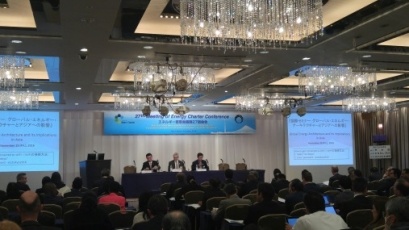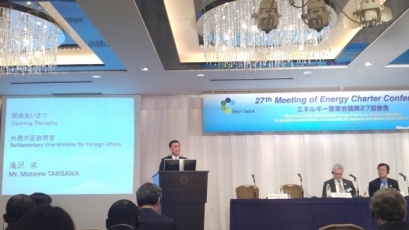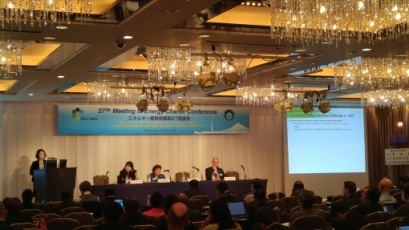Energy
Energy Security Workshop: Global Energy Architecture and its Implications in Asia


1 General Overview
(1) The Ministry of Foreign Affairs of Japan hosted a workshop titled “Global Energy Architecture and its Implications in Asia” in Tokyo on November 25, with more than 100 participants including government representatives, energy company representatives, researchers, personnel from embassies located in Tokyo, and media personnel (Agenda (PDF)  ).
).
(2) Mr. Motome Takisawa, Parliamentary Vice-Minister for Foreign Affairs, delivered opening remarks on behalf of the Ministry. At the opening session, Dr. Urban Rusnak, Secretary General, Energy Charter Secretariat, made a keynote speech, explaining the significance of the International Energy Charter as the basis for common rules in the international energy security and calling for the involvement of countries and international organizations across regions. Also, Dr. Sun Xianshen, Secretary General, International Energy Forum (IEF), made a keynote speech, stressing the importance of international cooperation including IEF and International Energy Charter, to address global energy issues, in the midst of uncertainty.
(3) The world energy situation is changing rapidly, such as through energy demand increase in emerging countries (particularly in Asia) and oil price stagnation. Throughout this year, global energy architecture and global energy governance have been discussed in many international fora including G7, G20, and IEF. This workshop was held as an outreach side-event of the Energy Charter Conference, aiming to strengthen international energy security including Japan’s energy security, deepen cooperation with related international organizations and frameworks, promote understanding of energy security issues, and send messages of Japan’s active involvement in the international energy issues through Japan’s energy policy.
2 Overview on Sessions

(1) Session 1: How to strengthen Energy Security by better mobilizing global energy architecture while addressing climate change: Implication and Future Prospects in Asia
| Moderator | : | Ms. Cecilia Tam, Special Adviser, Asia Pacific Energy Research Centre | |
| Panelists | : | Ms. Misako Takahashi, Director, Economic Security Division, Ministry of Foreign Affairs of Japan | |
| Prof. Han Wenke, Senior Researcher, Energy Research Institute, the National Development and Reform Commission, China | |||
| Dr. Prasert Sinsukprasert, Deputy Director General, Energy Policy and Planning Office, Ministry of Energy, Thailand | |||
| Mr. Yongping Zhai, Technical Advisor (Energy), Asia Development Bank | |||
| Mr. Jack (Masao) Watanabe, Senior Vice President, General Manager, Headquarters for the Middle East & Central Asia, Mitsubishi Corporation |
Director Takahashi pointed out Asia’s potential for further contribution to global energy architecture and called for cooperation and collaboration among the multiple international energy organizations.
Prof. Wenke stressed the necessity for structural reform of energy governance in order for the transition from the traditional energy and promotion of clean energy.
Dr. Sinsukprasert explained the current situations and benefits of power grid in the ASEAN region and introduced the LNG hubs in the region in addition to the overview of ASEAN Oil Security Agreement.
Mr. Zhai stressed the risk reduction for the promotion of low-carbon technologies, capacity building, international cooperation and building partnership in Asia as Asia Development Bank’s contribution to tackling the climate change.
Mr. Watanabe introduced the efforts on energy security in Asia, with the promotion of energy transition by the Paris Agreement and the continuous high demand for oil and gas.
During the Q&A session, participants and audience actively exchanged their views on deepening cooperation among the existing international organizations and frameworks in order to strengthen energy security in Asia.(2) Session 2: Global Energy Architecture for better global energy future: Challenges and Opportunities
| Moderator | : | Ms. Misako Takahashi, Director of Economic Security Division, Ministry of Foreign Affairs of Japan | |
| Panelists | : | Ms. Klara Rakhmetova, Chair of the Trade and Transit Group, Energy Charter | |
| Ms. Aya Yoshida, Head of Asia Pacific and Partnership Division, International Energy Agency | |||
| Dr. Henning Wuester, Director, Knowledge, Policy and Finance Centre, International Renewable Energy Agency |
Ms. Rakhmetova emphasized the significance of “Astana Declaration” issued at the Energy Charter Conference held in Kazakhstan in 2014 and expressed a sense of anticipation that more Asian countries will be joining the Energy Charter in the future.
Ms. Yoshida explained energy security strategies in Asia with the rapid increase in energy demand, roles of renewable energy as air pollution strategies and the importance of diversified energy, and stressed that International Energy Agency will further strengthen cooperation with Asian countries.
Dr. Wuester pointed out that renewable energy would further contribute energy security in Asia and stressed the importance of further promotion of renewable energy.
(3) Closing Session
To sum up, Ambassador Kazuo Kodama, Head of the Mission of Japan to the European Union, pointed out that it is critical how we manage energy security based on the dynamically changing global situations and called for diversification of energy resources including renewable energy and further international cooperation on energy issues.
3 Evaluations
(1) At this workshop, the practical and useful knowledge was shared through specialized and concrete discussion on energy security, taking into account the current situations and opportunities in the changing international energy landscape and the climate change strategies in Asia.
(2) Particularly, useful discussion arose as to energy security issues in Asia, energy governance, impact of efforts for reform and modernization of energy organizations on future energy situations, which helped the expansion of Energy Charter Treaty into Asia.
(3) Many Japanese private companies and research institutions participated, and this workshop provided opportunities for networking among people involved in energy areas, both Japanese and those from overseas.


 (Open a New Window)
(Open a New Window)